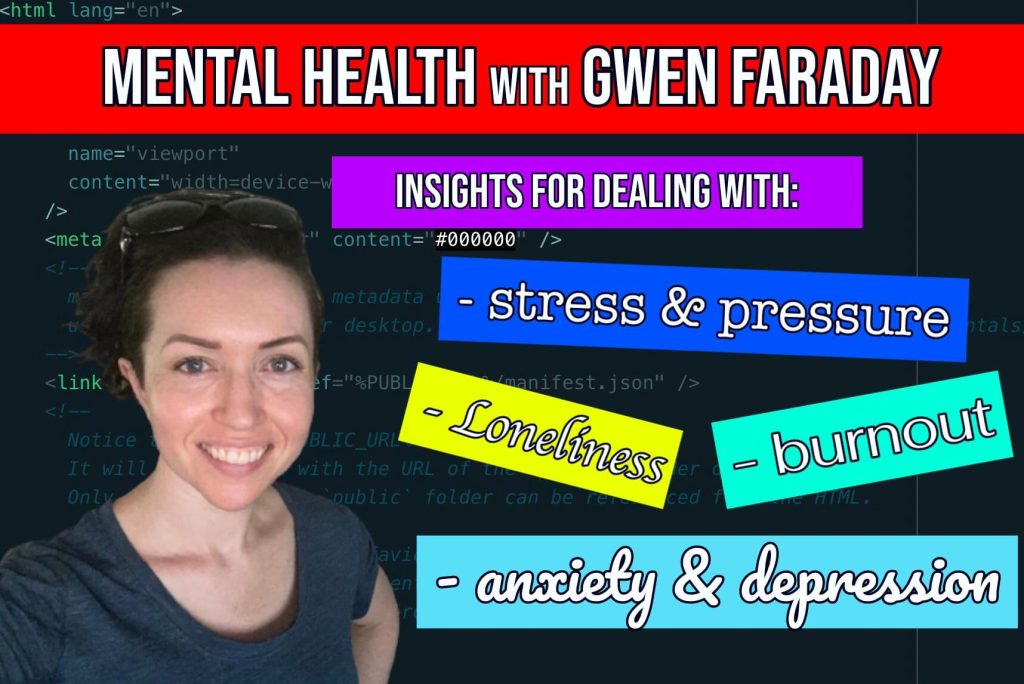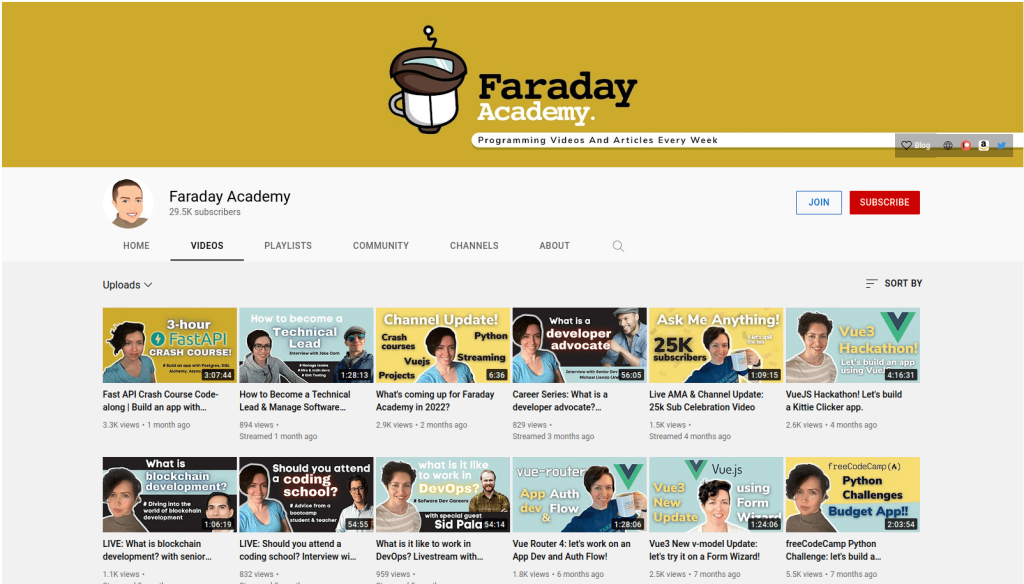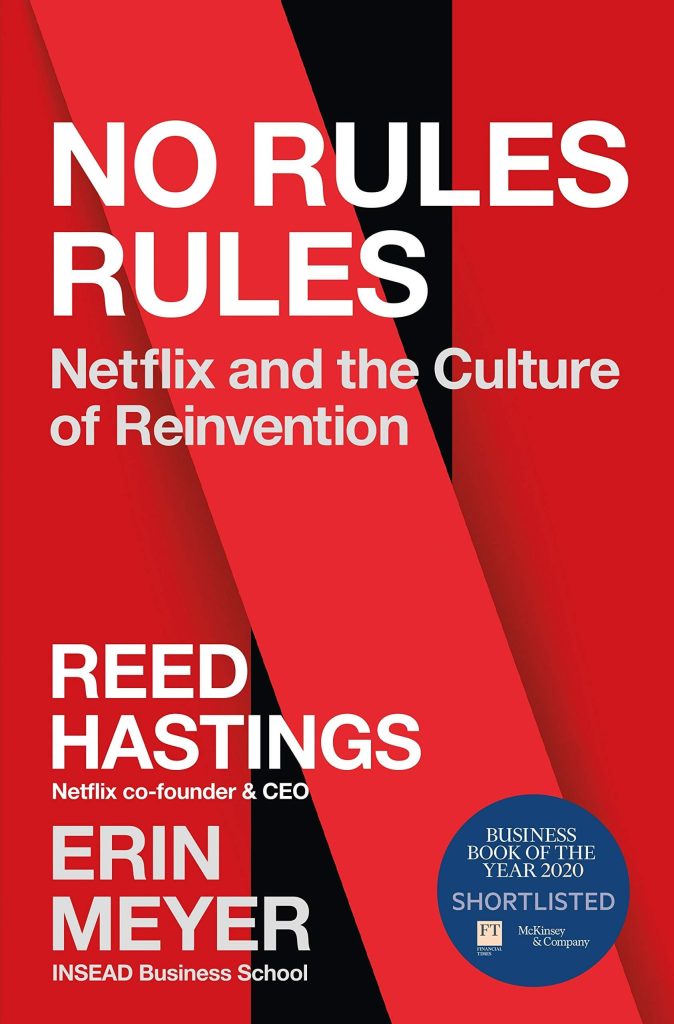Mental health is a tough topic.
How do you approach it?
Why does it matter?
What is mental health, even?
There aren’t any easy answers.
But in today’s interview with Gwen Faraday, she helps break it down for us.
A software developer and content creator on YouTube, Gwen shares her personal struggles and insights with the behemoth we call mental health.
You’ll discover:
- tips to stay on track
- how to avoid frustrating situations
- how employers can help accommodate mental health struggles
- why software development is a good career for people with mental health issues
You’ll also find a number of useful mental health resources for developers.
Read on as Gwen shares her personal experience with mental health and delivers solutions to the seemingly impossible.
This post contains affiliate links. We may receive compensation if you buy something. Read our disclosure for more details.
1. Tell us about yourself.
I work as a principal software engineer for a remote, startup SaaS company called Relevize.

We have a great team and I really enjoy the flexibility and autonomy that I have there.
When I’m not working, I love making videos and doing livestreams for my channel Faraday Academy.
I am also a blockchain enthusiast, a runner, and cat lady. 🙂 My cat’s name is Fish (like cat-fish) and he keeps me company and reminds me to relax.
2. How has mental health affected your coding journey? What are some techniques and approaches that help you stay on track?
My own personal mental health struggles – like anxiety – as well as a few burnouts have definitely negatively affected my coding career.
On the flipside, in times when my stress, anxiety, and workload were properly managed, I really excelled.
I’ve always been very open about my anxiety and having panic attacks. I have extreme social anxiety to the point where sometimes I feel like I never want to talk to another person again.

I also have ADHD and have had trouble focusing in some office environments.
I kind of put my mental health on the back-burner for a while as I was learning to code and trying to grow in my career.
Then, in the fall/winter of 2019, I had an epic meltdown/burnout and realized that I needed to take much better care of myself or I might never be able to work as a developer again at all.

I now see a regular therapist and have group therapy that has been helping with my anxiety.
One psychologist told me that exercise was the best activity to combat anxiety and attention problems so I try to do it regularly.
I’m a runner and I can definitely feel the difference when I stop working out for any period of time.
A few other things I have implemented in my routine to help:
✅ Mini device-free vacations: I will take a few hours to spend time in nature – somewhere like a park or a new running trail – without any notifications on.

This helps me to refresh my mind and I come back home feeling very clear headed. I try to do one of these at least every few weeks, and I would like to make it weekly.
✅ Meditation apps: I use the built-in meditation app on my Apple Watch to remind me to take some time to just close my eyes and breathe a few times a day.
The watch also has a reminder to stand up and walk around every hour, instead of sitting in front of the computer all day.
✅ Scheduled breaks: I use a technique called block scheduling to plan my calendar and I sprinkle breaks and time to take walks throughout the day.

I don’t always hit every break, but I shoot for at least 80% and that works for me.
3. Do you think software development is a good career field for people with mental health issues?
It always depends on the person and the workplace, but I would say in general, yes, as long as the person likes this type of work.
One reason is there are many accommodations that are easy to make at tech companies, like remote work and flexible schedules.
Some tech companies are also very forward thinking with mental health initiatives.
For example, Microsoft has a program dedicated to scouting and hiring people with autism and many of the companies I’ve worked for offer additional mental health resources above the standard health insurance (like text-based therapy, e.g. BetterHelp).

4. Do you think there’s a correlation between this career field and mental health issues?
I don’t think this is only a problem in tech; there has been an increase in suicides and mental health problems in general due to COVID and other things going on in the world.
I do think this kind of a job can exacerbate certain mental health issues in some people though.

Here are some of the mental health concerns I have seen in the industry:
✅ Stress and pressure: Software projects are tough to estimate properly so, in my experience, there are almost always weeks of long hours, high pressure, and high stress to get things wrapped up (this was especially true for me when I worked for consulting companies).
There are always bugs and other issues like the servers going down that can also add to an already full schedule.
✅ Burnout: Tech changes so fast that it can be a struggle to keep up with everything going on.
Always studying to keep up, while having a full time job (which might be very demanding as I mention above), while at the same time going to coding events and maintaining your network can be really overwhelming.
You need a lot of mental energy to focus while you are coding, and without adequate mental rest, you will eventually hit the point of burnout.

✅ Loneliness: I have not personally experienced this, but many people I have spoken to have said that they can get very lonely being in front of the computer for so many hours without much interaction with other people.
I think this is something to consider when you are looking for a job in tech; if you are someone who likes/needs more social interaction then there are some companies that focus on a lot of pair programming which might help to prevent loneliness.
✅ Anxiety and depression: I was reading an article recently about start-up culture and how it can promote mental health issues like depression.
That type of work environment, in particular, can push you to work for long hours without breaks or meaningful vacations.
That is not sustainable for most people and can take a toll on you mentally.
5. What parts of the software development career field can be particularly triggering?
One thing that I have experienced a few times is that companies and bosses are not always sensitive to people with different mental health or neurological needs.

Sometimes, simple requests can be met with a hard line drawn for no clear reason.
Storytime:
I worked at a company that was two minutes from my house and the room that the developers were in was an open room off of the hallway where people walked by all day long.
The room was also extremely cold to the point where people wore coats while working because the AC pumped cold air in there constantly.

Because it was right off of the hallway next to the kitchen, we could hear conversations both outside the room and inside when people stopped to check in on what we were doing.
This gave me a lot of anxiety and I was having a very hard time focusing.
I asked to be able to work from home part-time and they said, “No, being in the office full-time is a requirement” even though they had some remote employees and worked with an offshore team.
There were several empty offices so I started sneaking away for several hours at a time to get some focused work done, but they found out and told me I had to stay in the dev room.

They pretty much monitored where we were and how long we took breaks for; almost like a babysitter.
My boss was also very overbearing and my anxiety got so bad that I had a few meltdowns in the office and used to hide in the staircase to try to calm down from the feelings of extreme anxiety.
I need alone time during the day and I wasn’t able to get almost any there and it really wasn’t good for my mental health.
There were many other events that happened at that company and I won’t detail them all, but you get the picture.
A few small changes on their part like letting us work remote and fixing the in-office working environment could have really made me, and the rest of the team happier and more productive (they had just about 100% turnover so hopefully they have learned a lesson about how they treat their employees).
6. What can employers do to better accommodate developers with mental health challenges?
I think talking about it openly is the first step.

If you need help talking about it, the organization Open Sourcing Mental Illness has a lot of great information and handouts you can use to start the discussion at your workplace.
Please don’t judge or gatekeep when someone tells you they have something like a mental illness.
I know it is a natural human reaction sometimes, and I have been guilty of this in the past, but it can be very hurtful to someone who is already struggling with a mental illness or another condition.
You can never tell looking at someone what they are struggling with. If someone said they had terminal cancer, would you tell them “No, you don’t. You look fine.”
No one would say that.
Many mental illnesses and neurological conditions are invisible to people from the outside, so the best thing to do is just listen and ask what someone needs from us as coworkers, acquaintances, or members of the community.

The OSMI organization linked above also provides resources that can give you ideas on what kinds of services companies can provide for the mental well-being of employees.
7. What are some good mental health resources for developers?
Here is the list of some of my favorites:
🚀 Job Accommodation Network: Ideas and information about accommodations at work.
🚀 Open Sourcing Mental Illness: Information and research about mental health specifically in the tech industry.
🚀 Brene Brown’s books and talks about shame and vulnerability.
🚀 There are tons of YouTube videos and blog posts by programmers about mental health.
I recommend checking out this video on depression and anxiety by Traversy Media and some of the Google talks about these subjects on their YouTube channel.
I also have a few videos about mental health and burnout. It can be encouraging to hear other people’s stories.
🚀 One book that I read recently that doesn’t directly talk about mental health but emphasizes the importance of open communication and taking real vacations from work is “No Rules Rules” by Reed Hastings and Erin Meyer about the work culture at Netflix.
And our final question for Gwen Faraday:
8. Is there anything else you’d like to add?
There is a wonderful movement going on now to promote mental health and neurodiversity acceptance.
People are becoming more aware of mental illness every year.
Today’s culture is very different from previous attitudes of, just get over it, use your willpower.
If you don’t understand that much about mental illness and how it affects people, please check out the resources above.
If you would like to give me feedback on this topic or reach out to me, please email me at [email protected].
Gwen Faraday Interview: Conclusion
There isn’t anything easy about dealing with mental health.
But whether you’re struggling with a mental health issue like anxiety and depression, occasionally feel a bout of burnout, or know somebody in your workplace going through a tough time, there is help available.
Finally, thank you Gwen Faraday for sharing your own journey with mental health while providing insight and ideas for those who may also be struggling.


